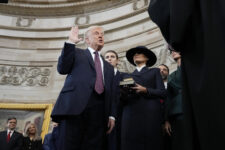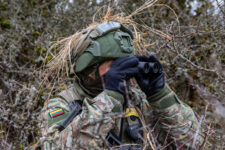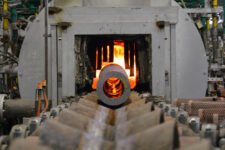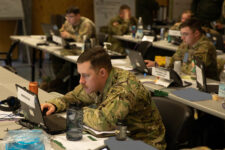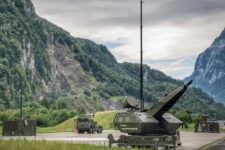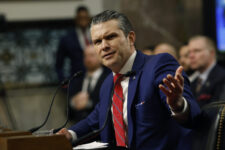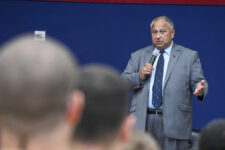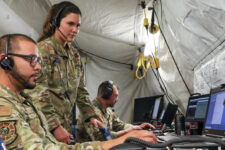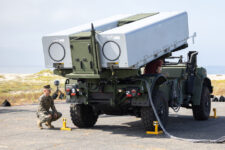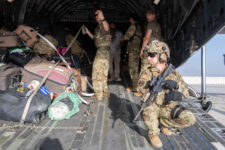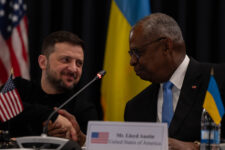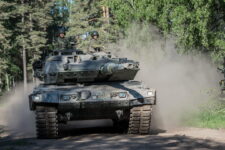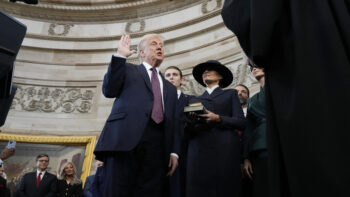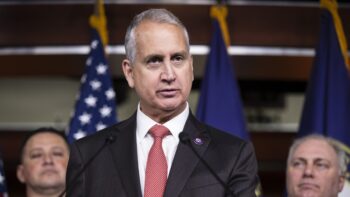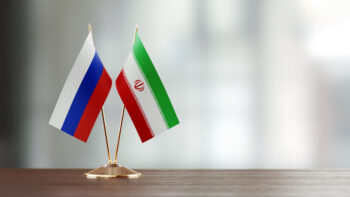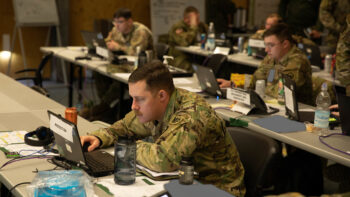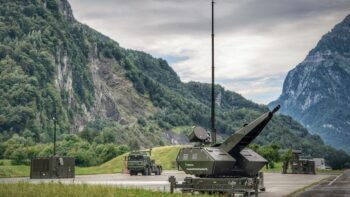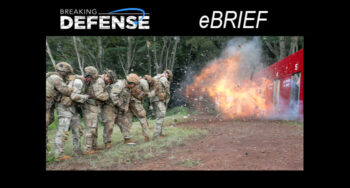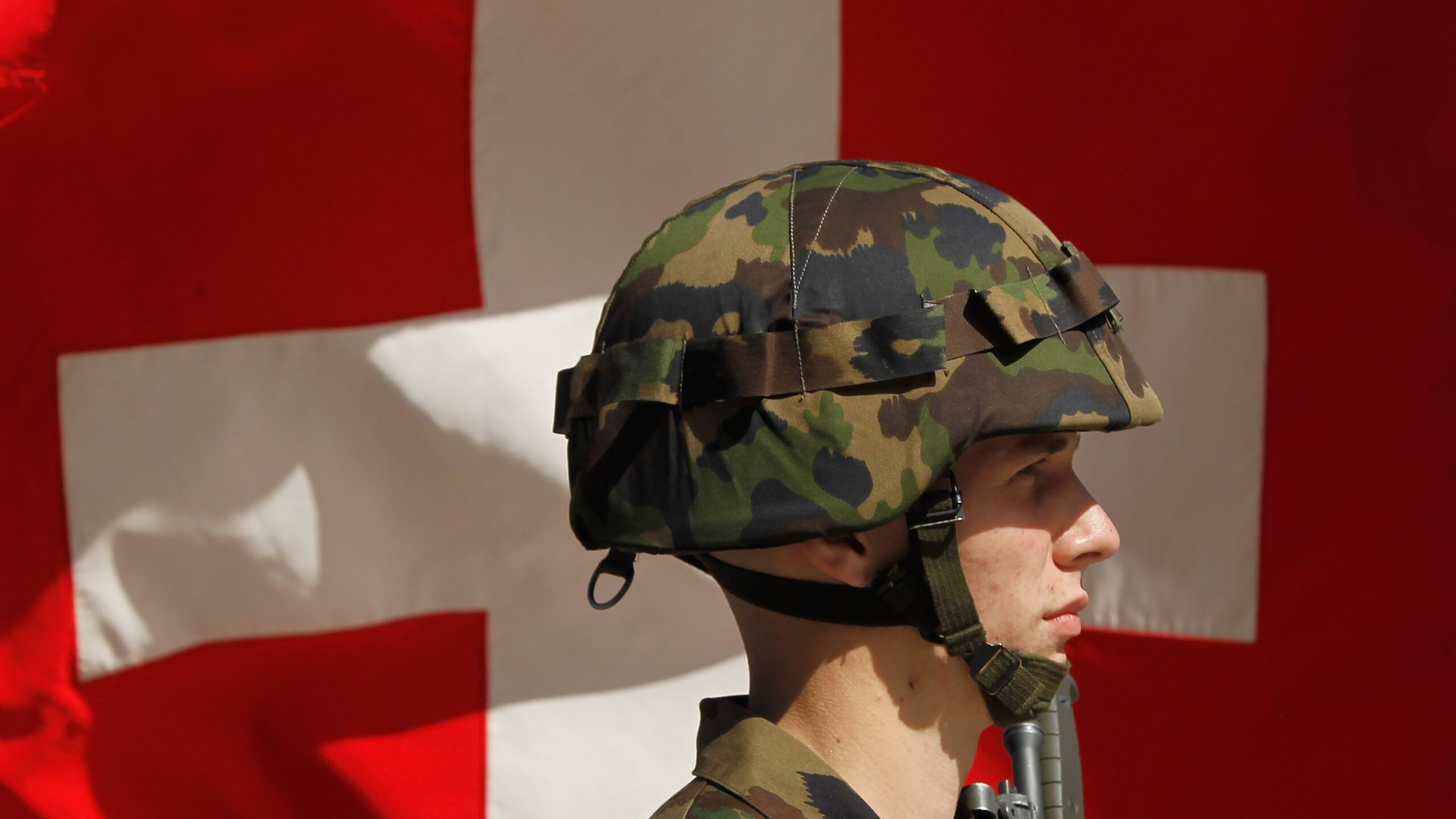
A Swiss soldier stands at attention in front of a Swiss flag in Bern, Switzerland. ( Sean Gallup/Getty Images)
PARIS — Switzerland has been a military neutral country since the Treaty of Paris was signed in 1815. In truth, it has in effect been neutral since 1515, taking to heart a saying attributed to the confederation’s patron saint, Nicholas of Flüe: “don’t get involved in other people’s affairs.”
But arguments about exactly what this neutrality entails and whether it can be interpreted as “failure to provide assistance” have erupted over the past few days in both Switzerland and Germany after Berne, for the second time since June, last week refused a request by Germany’s Defense Minister Christine Malbrecht for a license to re-export Swiss munitions to Ukraine.
Germany is finding this a hard pill to swallow, with some notable politicians threatening that Germany will stop buying weapons from Switzerland — hardly an empty threat, as Germany is Switzerland’s largest arms export market. In response, Switzerland has countered saying that Berlin “no longer respects” their political neutrality.
In 2021, Germany spent CHF 123.4 million ($125.4 million) on Swiss weapons, ahead of Denmark (CHF 96 million) and the United States (CHF 90.2 million), according to Swiss ministry of the economy figures.
Marcus Faber, head of Germany’s liberal Free Democratic party’s parliamentary defense group, wrote on Twitter on Nov. 3 that “if Switzerland does not provide ammunition to attacked countries, then Germany too must decouple its supply chain from the friendly confederation. In the darkest hour we need reliable partners against aggressive dictatorships.”
Roderich Kieswetter, of the opposition conservative Christian Democrats and a member of the Bundestag Foreign Affairs Committee, wrote in an article published by respected Swiss German-language daily Tages Anzeiger that it is “completely incomprehensible that Switzerland does not rethink its attitude.” He said in another interview with the Frankfurter Allgemeine Zeitung on Oct. 31 that he would support an end to weapons purchases from Switzerland. “Whoever shirks away in this situation has to accept the accusation of failing to provide assistance,” he remarked.
At the heart of the dispute is Germany’s desire to send 12,400 35mm rounds (manufactured by Oerlikon-Bührle, a Swiss company which no longer exists) to Ukraine, bought decades ago to restock the Gepard air defense tanks, also known as “Cheetah” flak guns. The Gepards themselves were gifted to Ukraine by the German army, which no longer uses them, and the Ukrainians have found them very effective against Russian cruise missiles and the slow Iranian drones that have been battering Ukrainian civilian targets this fall. However, ammunition is in short supply, and Berlin had hoped to ship the rounds to Kyiv without objection.
The original sales contract for the Swiss-made munitions specified that if Berlin wanted to re-sell or donate these munitions, it needed to obtain a license from Switzerland — and there is a law on the books in Switzerland that forbids defense equipment from being re-exported to conflict zones. As a result, in June, Switzerland turned down Germany’s request. The same reason was invoked in June to refuse a Danish request to send 22 Swiss-made Piranha III tanks to Ukraine.
Guy Parmelin, Swiss minister of the economy, wrote to Lambrecht that “there is still no reason to respond favorably to Germany’s request to transfer Swiss war material to Ukraine.” He noted that “equal treatment arising from the law of neutrality does not allow Switzerland to approve a request for the export of war material from Switzerland to Ukraine as long as this country is involved in an international armed conflict.” Parmelin added that “the criteria for authorisation as laid out in Swiss legislation regarding war material also excludes the delivery of war material to countries involved in such conflicts.”
Jean-Luc Addor, a parliamentarian from the nationalist right-wing UDC party, the biggest in the Swiss coalition government, said on Swiss radio that “if our country is still neutral then we must say no to the export of these munitions,” even if the Ukrainian government says they will serve to protect grain exports and thereby avoid a famine in Africa. Addor insists Switzerland remain uninvolved in this conflict.
However, not every Swiss politician is in agreement with the strict neutrality stance. Philippe Matthias Bregy, a member of the centrist party, Centre, says “for us it’s obvious that Russia is attacking Europe in Ukraine. The Ukrainians are defending European values, and so in this particular case, the Federal Council [parliament] must give its permission.” He argues that the Swiss constitution contains an article which quite clearly states that the Federal Council has the right to do whatever it takes in its foreign policy do defend the interests of Switzerland — and in this special situation, with Russia invading another European country, it is the Federal Council’s duty to react.
A motion requiring that certain countries with similar values and export rules to Switzerland should be allowed to export Swiss-produced weapons and ammunition to third parties was filed on June 7 by Thierry Burkart, president of Switzerland’s FDP liberal party. That language is pending in the Swiss parliament, but even if the motion is adopted, a possible change in the law would only apply to future arms sales.
Meanwhile, Switzerland is supplying CHF100 million ($101.6 million) worth of humanitarian aid to Ukraine to help restore drinking water supplies and to repair the energy supply infrastructures that have been damaged by Russian strikes.
After inauguration, who is running Trump’s Pentagon?
Several hours after Trump was sworn in, the administration released a list of who will be serving as the acting heads of the Defense Department.
